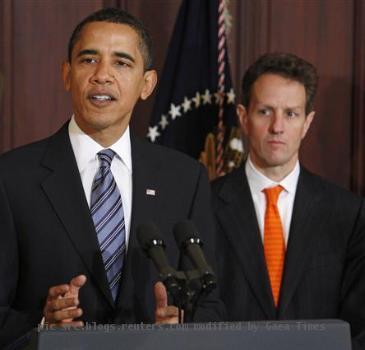Obama’s arms control agenda may set US up for success at nuclear treaty conference
By Charles J. Hanley, APFriday, May 7, 2010
US nuke agenda may bring success at treaty session
UNITED NATIONS — President Barack Obama’s arms control agenda may be setting the U.S. up for success at Iran’s expense at the twice-a-decade conference reviewing the Nuclear Nonproliferation Treaty (NPT).
Obama’s nuclear arms policies, which stand in sharp contrast to those of the Bush administration, have produced a “completely different atmosphere” at the conference, said Sergio Duarte, the Brazilian diplomat who presided over the failed NPT review meeting in 2005.
Even Cuba’s representative Pedro Nunez Mosquera had a kind word for the Americans, citing the “positive sign” from Washington.
As a result, Iran may be the loser if the monthlong conference rallies to the call by the U.S. and others for a tougher international stance on those violating the nonproliferation treaty, as Tehran allegedly is doing with a nuclear program the West suspects is designed to build bombs.
Under the 189-nation, 40-year-old treaty, members without nuclear weapons pledged not to acquire them, while nuclear-weapon states pledged to move toward eliminating them.
After taking office in 2001, the U.S. administration of President George W. Bush reversed previous U.S. commitments to such disarmament steps as activating the treaty banning all nuclear tests and negotiating another banning production of bomb materials. The 2005 NPT conference consequently broke down in anti-U.S. recrimination, failing to adopt a single consensus recommendation for strengthening the NPT.
Obama took office embracing those two treaties and the goal of a world free of nuclear weapons. His team negotiated a new deal with Russia reducing the two countries’ nuclear arms arsenals. He hosted a much-praised summit on nuclear security. And his administration officially took nuclear weapons down a notch in importance in U.S. defense planning.
“The difference is almost diametrical,” said Duarte, now the U.N. disarmament affairs chief.
Obama even, in a sense, won credit for the huge U.S. nuclear arsenal, perennial target of global critics. When Washington this week disclosed for the first time that stockpile’s giant size, 5,113 in-service warheads, U.N. Secretary-General Ban Ki-moon praised the U.S. president’s “courage and leadership,” since transparency in numbers is vital to future arms control.
Such “positive signals” have “contributed to an atmosphere of cautious optimism” at the 2010 conference, veteran South African negotiator Abdul S. Minty told fellow delegates, echoing what many were saying.
In the treaty’s disarmament column, South Africa, Cuba and the great conference majority will still press for the nuclear powers to move more quickly toward a nuclear-free world.
But in exchange for such commitments, the U.S. and its allies may see a consensus final document emerge here giving them what they seek on the nonproliferation side: Support for a stronger International Atomic Energy Agency, the U.N. nuclear watchdog; for more stringent inspections of nuclear-power programs to detect cheating; and for tough sanctions on those who withdraw from the treaty under suspicious circumstances.
Many Iran critics believe Tehran will reach the threshold of bombmaking and then pull out of the NPT with three months’ notice, under its withdrawal article. Iran contends its nuclear program is for peaceful purposes only.
Longtime conference observer Daryl Kimball believes Iranian President Mahmoud Ahmadinejad’s “caustic” speech to the conference Monday, when he failed to address international concerns about his country’s NPT compliance, hurt Tehran’s position here.
“It makes it difficult for the non-nuclear-weapon majority to align themselves with Iran,” said Kimball, of Washington’s Arms Control Association.
Still, much could go wrong for the Americans in the coming three weeks of conference bargaining.
“We mustn’t be complacent,” said Patricia Lewis, a nuclear expert at the Monterey Institute of International Studies. “Although there’s a lot of good will over the changes in U.S. policy, what there’s unease about is whether or not the U.S. administration can deliver, for example, on the CTBT” — the Comprehensive Test Ban Treaty, still facing Republican opposition to U.S. Senate ratification.
The partisan flip-flopping of U.S. leadership and foreign policy worries many, said Duarte.
“The U.S. attitude has changed. That was very important,” he said. “Many wish this will continue to be the case.”
Tags: Barack Obama, International Agreements, Iran, Middle East, North America, Nuclear Weapons, Political Issues, Tehran, United Nations, United States, Weapons Administration, Weapons Of Mass Destruction

